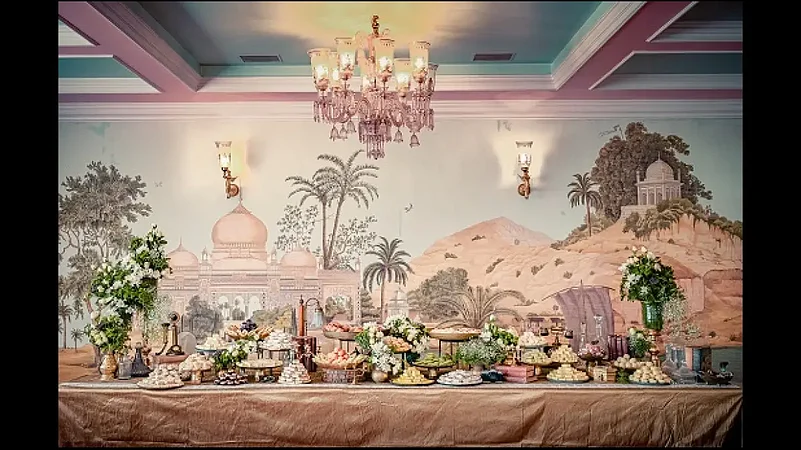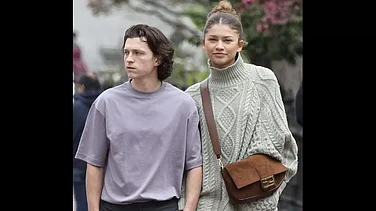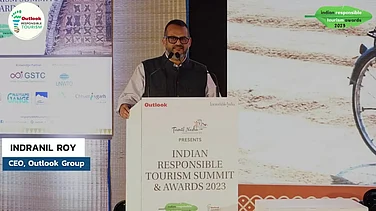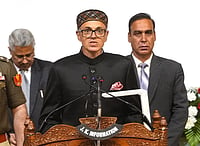Pointing to a long table artistically laid out with a mind-boggling variety of ‘mishti’ (Bengali for sweetmeat), exclaimed Lahana Ghosh, whose family owns the popular mishti brand Jugal’s, “Can you imagine the variety that can be made by using just ‘chhana’ [cottage cheese] and sugar?” The people gathered around the table could only nod in agreement.
Kolkata To Host Literature Festival Based Only On 'Mishti'
If literary festivals are on your travel bucket list, you cannot miss this first of its kind event, to be held in December this year

On the last day of May, the luxurious Glenburn Penthouse, which overlooks some of the greenest views of Kolkata, saw a gathering of the city’s who’s who hailing from diverse sectors, including foreign missions, entertainment industry, and business houses. And they were there for a single reason – their love for ‘mishti’.
Incidentally, the tagline coined by the state government tourism department says, 'Welcome to Bengal - The Sweetst Part of India'.?
Very few people from outside the state know about the varieties of sweets available here, pointed out actor Saswata Chatterjee. Ask any visitor about their favourite Bengali sweet, they will invariably reply ‘rosogolla’ and ‘misti doi’, he said. ‘Sandesh’ is a distant third, somebody else pipped in.
Sweets have always been an integral part of Bengal’s life and culture; it has found wide mention across various cultural genres, from literature to cinema. Medieval Bengali texts too mention about the variety of sweets found in Bengal. However, it was the introduction of the ‘channa’ by the Portuguese about 400 years ago, which prompted the sweetmeat makers of Bengal to give a free rein to their imagination. Prior to this, sweets were made from dried milk (recall the Peda sold at most temples as offerings), sugar (recall the ‘kodma’ or ‘mothh’ offered to the Goddess of Learning Saraswati during her annual celebration), or coconut (the ‘narkel naru’ a must during the post-Vijayadashami festivity). "Mishti has been a part of our culture for thousands of years. For example the earliest reference of Malpua, a deep fried pancake soaked in syrup goes back 3,500 years, to the Rig Veda that calls it ‘apupa’. Over the centuries, apupa incorporated many more cultural influences and was embraced by different faiths," said Ghosh.?
Unfortunately, there is no comprehensive recording of the history of Bengali sweets (some with very interesting anecdotes to their names – such as the Ladikeni named after Lady Canning, wife of the first Viceroy of British India) or their presence across cultural genres.
To fill in this gap and to popularise Bengali sweets beyond the state, Ghosh has conceptualised a literary festival based on the theme of ‘mishti’. Called the Jugal’s Literature Festival, it is the first literary festival of its kind, and will be held in December this year.
Ghosh, who was earlier working in Canada, returned to Kolkata to take up the reins of the family business; among other things, she decided to break into the male dominated mishti-making industry of Bengal with a team of trained female mishti-makers.? Interestingly, it was to Jugal’s Park Circus outlet that Hollywood’s favourite chef and Netflix sensation Asma Khan, wended her way when she was in Kolkata in January this year.
Globetrotting?journalist and photographer Kounteya Sinha is the festival director while Oiendrila Ray Kapur is the creative director.
The festival is scheduled to take place between December 9 and 11 this year.
According to the organisers, people who have already agreed to come on board Asma Said Khan, Dr Colin Taylor Sen (food anthropologist and author), Padmashri Pushpesh Pant (academic, food critic and historian), Dr Kunal Basu (author and academic), Nirupama Rao (former Foreign Secretary and Ambassador), former Union Culture Secretary and Member of Parliament Jawhar Sarkar, eminent artist Jogen Choudhury, Sanjoo Malhotra (founder of India Festival in Sweden), and others.
The festival will be held across 10 venues, including some of Kolkata's iconic addresses such as traditional homes, art galleries and modern institutions, each venue holding such an event for the first time, according to the organisers. Said Ray Kapur, "I am going to use the greatest flavour of Kolkata - its freedom - in designing the festival. The freedom of thought, in ideas, in the way we protest or celebrate. I will use the backdrop of Kolkata - its built architecture - old bastions of history to modern architectural wonders - to create this festival."
And if all goes according to plan, Kolkata may also see the world's longest mishti-laden table.
As guests sampled the variety of sweets, interesting bits of conversation floated around.
Bengal film industry’s popular actor Prasenjit Chatterjee reminisced how his father (veteran actor Biswajit Chatterjee) who would travel frequently between the two cities at the height of his career, would invariably carry loads of sweets from Kolkata to Mumbai for his contemporaries. Madhu Neotia, who heads Neotia Arts Trust, and actor Ekavali Khanna vouched that the tradition continues even today. “No matter which city I travel to, I have to carry sweets from Kolkata,” said Neotia. According to Khanna, who shuttles between Kolkata and Mumbai for work, many of her co-actors and team members put in a special request for ‘roskadom’ from Kolkata.
For director Arindam Sil, the idea of an exclusive literary festival on mishti was ‘unique and intriguing’. The fact that it is not unusual to find the best of friends arguing over which is the best mishti shop in the city or whose signature sweet was the best, shows how serious Bengalis are about mishti, he added.
Culinary literature, especially Indian culinary literature is not celebrated enough, feels actor Sujay Prasad Chatterjee, who is looking forward to the festival as a platform which will ensure?Bengali mishti is appreciated worldwide.?
According to Dr Debanjan Chakrabarti, Director - British Council, globally Bengal’s sweets rarely enjoy a distinct identity, except perhaps for ‘rosogolla’; otherwise, it pretty much gets clubbed under Indian sweets. He hoped that the organisers of the literary fest may show the way in appreciating and documenting the history of undivided Bengal through sweets. “The literary festival will be a pivotal point in telling the stories around our sweets,” he said.
Husna-Tara Prakash, owner and managing director at Glenburn Tea Estate & Boutique Hotel, made an interesting observation about pairing tea, be it pure Darjeeling tea or flavoured tea, with Bengali sweets. “When we hold our Kolkata city tour and stop at the St John’s Church, we serve Darjeeling tea with a bit of Sandesh on the side,” she added.

Many of the guests were seen approaching integrative nutrition?and health coach Prabha Goyal for tips on how to stay fit despite their love for the Bengali sweets. Goyal said while it is important to eat genuine organic food and exercise regularly, she was not averse to people enjoying sweets so long as there is no medical complication and they are able to have it in moderate proportions.?
As a run up to the literary festival, the organisers are also leaving no stones unturned to prepare a comprehensive dossier on the lost knowledge of mishti, said festival director Kounteya Sinha. “This will be a litfest with a difference, where we will look into the science of food, how it changed milk, among?other things,” he said.
- Previous Story
 Tom Holland Recalls ‘Trip Of A Lifetime' Visiting India With Girlfriend Zendaya
Tom Holland Recalls ‘Trip Of A Lifetime' Visiting India With Girlfriend Zendaya - Next Story




















